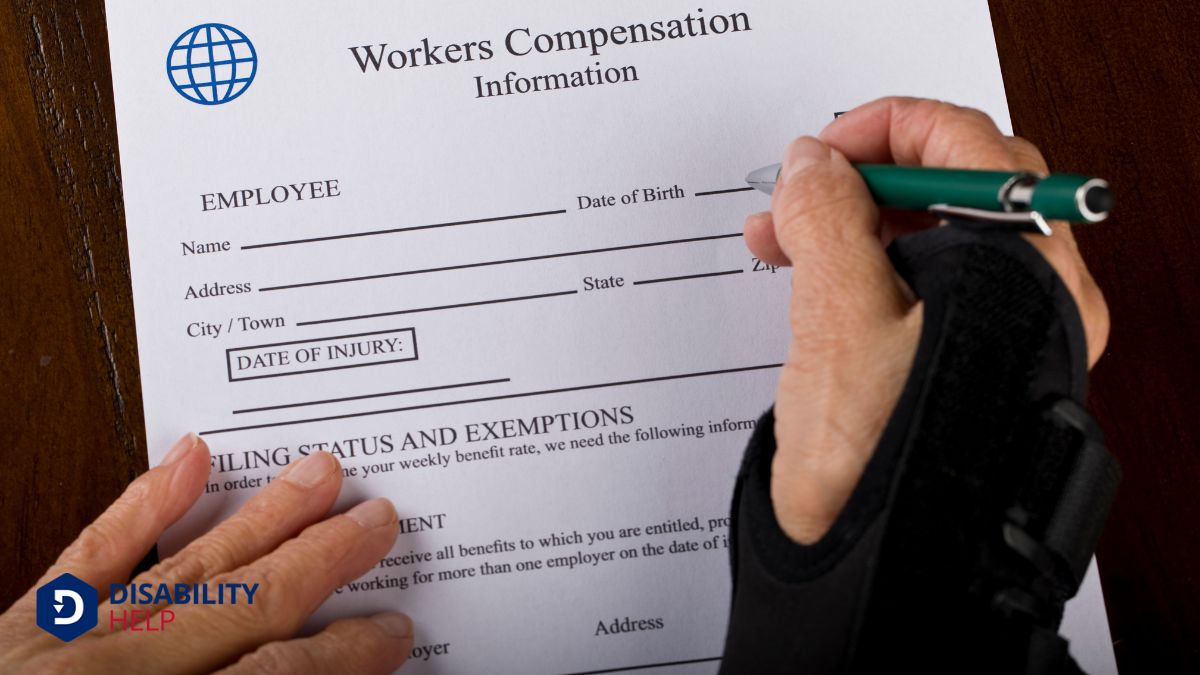When we consider the criteria for qualifying for workers' compensation, we need to focus on several vital areas. For starters, it's important to determine whether you're classified as an employee or an independent contractor, as this distinction can make a significant difference in eligibility. Additionally, the nature and location of the injury play a significant role; it must occur during work-related activities. Notifying your employer promptly is another essential step in the process. But what happens if the employer doesn't have workers' compensation insurance or if there are pre-existing conditions? Let's explore these complexities further.
Key Takeaways
- Workers' compensation covers injuries incurred at the workplace or during work-related activities.
- Immediate reporting of work-related injuries to employers is crucial for eligibility.
- Independent contractors and most volunteers are generally ineligible for workers' compensation benefits.
- Employers must carry workers' compensation insurance, and non-subscribing employers face potential lawsuits.
- Seasonal and temporary workers' eligibility varies by state laws and employment relationships.
Employee Status

When it comes to qualifying for workers' compensation, understanding your employee status is vital. Not everyone who works for an employer is automatically eligible for these benefits. Workers classified as independent contractors typically aren't eligible for workers' compensation. This distinction matters because independent contractors aren't considered employees under the law.
Volunteers also generally don't qualify for workers' compensation. However, there are exceptions, such as certain volunteer firefighters who might be covered. It's important to know where you stand regarding employee status to determine if you're covered.
Employees must have their injuries or illnesses occur at the workplace or during work-related activities to qualify for workers' compensation. This means if you get hurt while performing your job duties, you should be covered by workers' compensation. Pre-existing conditions could impact your eligibility, especially if the injury exacerbates a condition you already had.
Promptly notifying your employer after an injury is another crucial step. Employers need to know about the injury as soon as possible to begin the workers' compensation process. Understanding these factors helps guarantee you get the compensation you're entitled to if you get injured or fall ill due to your job.
Employer Coverage
Employer coverage is a critical aspect of workers' compensation eligibility. In Texas, employers must carry workers' compensation insurance unless they choose to opt out of the system. Surprisingly, 28% of private employers in Texas decide not to have workers' compensation insurance coverage. This decision, known as "non-subscribing," significantly impacts employees.
When private employers in Texas opt out of carrying workers' compensation insurance, they must notify their employees about their non-subscribing status. Additionally, they need to report any workplace injuries to the Division of Workers' Compensation (DWC). For employees, this means that if they work for a non-subscribing employer, they aren't automatically covered by workers' compensation for any work-related injuries.
One substantial consequence for non-subscribing employers is the potential for lawsuits. Employees working for these employers can sue them for damages related to work-related injuries. This puts an added responsibility on non-subscribing employers to maintain a safe working environment and thoroughly document any incidents that occur.
Work-Related Injuries
When considering work-related injuries, we need to focus on where the accident happened and when it occurred.
It's important that we report any injuries to our employer as soon as possible. This helps guarantee that our claim for workers' compensation is supported by substantial evidence linking the injury to our job activities.
Accident Location Relevance
Accident location plays an essential role in qualifying for workers compensation benefits. It's vital to understand that workers compensation typically covers injuries that occur at the workplace or during work-related activities. This means the accident location is directly tied to the eligibility criteria for workers compensation benefits. If we're looking to prove that an injury is work-related, pinpointing where it happened can make or break our claim.
To evoke a clearer picture, consider these scenarios:
- On-site injury: You slip and fall in the company's warehouse during your shift.
- Off-site injury: You get into a car accident while making deliveries for your employer.
- Remote work injury: You suffer a strain injury while working from your home office.
Each of these scenarios involves a different accident location but shares a common thread: they occur during work-related activities. Establishing that our workplace injury happened in one of these settings helps substantiate our claim for workers' compensation benefits.
Injury Timing Importance
Understanding the timing of an injury is crucial for qualifying for workers' compensation benefits. Work-related injuries must occur during the course of employment to be considered for these benefits. This means that the injury should happen while we're performing our work duties or while we're on company premises. Injury timing plays a vital role in determining eligibility for benefits.
If we sustain injuries outside of work hours or while engaged in activities unrelated to our job tasks, those injuries typically won't qualify for workers' compensation. It's important to recognize that not all injuries that occur at a workplace will automatically be deemed work-related. The context and timing of the injury are key factors that affect our eligibility for benefits.
Immediate reporting of work-related injuries is another crucial aspect. When we report an injury right away, it helps establish a clear connection between the incident and our employment. This prompt action can have a significant impact on the success of our workers' compensation claim.
Employer Reporting Necessity
Recognizing the significance of injury timing leads us to another essential aspect: the need for employers to report work-related injuries promptly. When it comes to employer reporting, timely submission to the workers' compensation insurance carrier is vital. It guarantees employees receive the necessary medical treatment and benefits without delay.
By reporting work-related injuries right away, employers assist in the smooth processing of workers' compensation claims. This immediate action helps prevent unnecessary suffering and financial hardship for injured employees. Conversely, failure to report can lead to significant delays, making the recovery process more challenging for everyone involved.
Let's take a moment to understand the emotional impact of timely employer reporting:
- Peace of mind: Employees can concentrate on recovery, knowing they'll receive the necessary medical treatment and benefits.
- Trust and security: A prompt response builds trust between employees and employers, fostering a supportive work environment.
- Legal protection: Ensures adherence to laws, safeguarding both the employee's and employer's rights.
Employers are legally obligated to report any work-related injuries to the appropriate authorities. This adherence to laws not only protects workers but also reinforces the integrity of the workers' compensation system. By prioritizing timely reporting, we can help guarantee a fair and efficient process for everyone.
Reporting Deadlines

When it comes to qualifying for workers' compensation in Texas, meeting the reporting deadlines is crucial. Injured employees must report work-related injuries to their employer within 30 days to be eligible for workers' compensation benefits. Missing this 30-day window can result in the denial of benefits, which means we won't receive the timely medical treatment and income benefits we may need to recover.
Once we've reported our injury, our employer must then report it to their workers' compensation insurance carrier within one day. This step is crucial because prompt reporting guarantees that the claims process begins quickly, allowing us to access the necessary support without undue delay.
Understanding and complying with these reporting deadlines safeguards our rights as injured workers. If we fail to report the injury on time, it could jeopardize our ability to claim workers' compensation benefits, leaving us without essential medical care and financial support during our recovery period.
Special Worker Rules
When it comes to special worker rules, we need to assess how state laws handle coverage for seasonal and temporary workers. Some states may exclude seasonal workers from workers' compensation, while rules for temp workers can vary widely. Understanding these distinctions is essential for ensuring proper eligibility and coverage.
Seasonal Worker Exclusions
Traversing the labyrinth of workers' compensation laws can be particularly challenging for seasonal workers, who may find themselves excluded from coverage in certain states. These exclusions depend heavily on state laws and specific circumstances surrounding the nature and duration of seasonal work. Often, seasonal workers aren't considered regular employees, which can impact their eligibility for workers' compensation coverage.
Understanding the intricacies of these laws is essential for seasonal workers seeking to protect their rights. State laws vary, and some may have stringent criteria that could leave seasonal workers without the safety net they need. The nature of seasonal work, often short-term and tied to specific times of the year, further complicates the matter.
- Confusion: The varying state laws create a complex web that's hard to navigate.
- Frustration: Exclusion from coverage can leave workers vulnerable and unprotected.
- Uncertainty: Questions of eligibility can cause stress and anxiety, especially after an injury.
It's vital for seasonal workers to fully understand their rights and explore their coverage options under workers' compensation laws. By staying informed, they can better navigate the system and advocate for the protection they deserve.
Temp Worker Coverage
Traversing the terrain of workers' compensation can be especially intricate for temp workers, who often find themselves caught between staffing agencies and host employers. The good news is that temp workers may still be eligible for workers' compensation if they're hired through a staffing agencyThe capacity of individuals with disabilities to act independently and make their own choices. or directly by an employer.
In many states, these workers are considered employees of both the staffing agency and the host employer, which can impact how claims are processed.
The specific rules for temp worker coverage vary by state and depend on the nature of the employment relationship. Understanding these nuances is vital for temp workers to ensure they receive the benefits they're entitled to if they suffer work-related injuries.
When injured on the job, temp workers can qualify for medical treatment and wage replacement benefits under workers' compensation. It's crucial to report any work-related injuries promptly to gain timely access to these benefits.
Temporary Workers
Temporary workers form a significant part of the workforce, and understanding their eligibility for workers' compensation is important. For temporary workers, the key to accessing workers' compensation benefits often lies in how they're classified by the hiring agency. If classified as employees, they may be eligible for these benefits. Importantly, the rules and regulations that govern this eligibility can vary widely from state to state.
In many states, the temp agency is responsible for providing workers' comp coverage. This means that when a temporary worker is injured on the job, they need to report their injuries not only to the host employer but also to the hiring agency.
The length of employment might also affect eligibility, so it's essential for workers to be aware of their specific state regulations.
To emphasize why understanding these details matters, consider:
- Uncertainty: Not knowing your eligibility can lead to anxiety and financial pressure.
- Fairness: You deserve the same protection as permanent employees.
- Peace of mind: Knowing your rights ensures you can focus on your work without worry.
Independent Contractors

While temporary workers have specific pathways to qualify for workers' compensation, the situation is quite different for independent contractors. Generally, independent contractors aren't eligible for workers' compensation benefits. This is because they're considered self-employed and have control over their working relationship with the hiring entity.
However, issues can arise when there's a misclassification of workers. Sometimes, workers are labeled as independent contractors when they should be employees. Misclassification can deny rightful workers the benefits they deserve. Courts often step in to resolve these disputes, examining factors like control over the working relationship and the nature of the work performed.
It's noteworthy to mention that eligibility for workers' comp hinges on whether the injury occurred at the workplace or during work-related activities. This distinction is essential for determining if someone qualifies for benefits.
Interestingly, some states make exceptions for volunteer firefighters, who might still be eligible for workers' compensation despite being classified as independent contractors. These exceptions highlight how nuanced and varied the rules can be.
Understanding these distinctions helps us navigate the complexities of workers' compensation and ensures that we're conscious of our rights and responsibilities.
Medical Treatment
When it comes to workers' compensation, medical treatment is an important component that guarantees injured employees receive the care they need. It's common knowledge that suffering from work-related injuries can be overwhelming, but understanding the medical treatment process within workers' compensation can offer some relief.
Workers' compensation insurance covers a wide range of medical treatments, including doctor visits, hospital stays, surgeries, medications, and rehabilitationThe process of helping individuals with disabilities achieve and maintain their optimal physical, se... services. It's essential to seek treatment from healthcare providers approved by your employer's workers' comp insurance to secure coverage. These providers are chosen because they comprehend the specific requirements and processes involved in treating work-related injuries.
Employers play a vital role in making sure that we, as employees, receive prompt and necessary medical treatment. The aim is to provide reasonable and necessary care to assist us in recovering and returning to work.
- Immediate and effective care: Ensuring we receive timely treatment can make all the difference in our recovery.
- Support for ongoing medical care: Physical therapy and specialized treatments can be crucial for long-term recovery.
- Peace of mind: Being aware that our medical expenses are covered helps us focus on healing.
Let's remember, taking advantage of the medical treatment covered under workers' compensation is our right and can greatly aid in our recovery journey.
Filing a Claim
Filing a workers' compensation claim can seem daunting, but taking the right steps early on is important for securing the benefits you're entitled to.
First, let's make sure we report the work-related injuryAn injury that occurs in the course of employment, potentially leading to temporary or permanent dis... to our employer immediately. This kickstarts the workers' compensation claim process and sets everything in motion.
Next, we'll need to seek medical treatment for the injury. Keep detailed records of all medical expenses we incur, as these documents will be essential when filing a claim. Often, our employer will provide a list of approved healthcare providers we can visit. It's crucial to follow this list to avoid issues with our claim later on.
After receiving medical care, we should submit a workers' compensation claim with our employer's insurance company. This step is vital to receiving benefits for our injury, including coverage for medical expenses and compensation for lost income. Make sure we follow all instructions given by the insurance company, attend any required medical evaluations, and provide all necessary documentation.
Frequently Asked Questions
What types of injuries or illnesses qualify for workers' compensation?
- Workers' compensation covers injuries and illnesses that are directly related to an employee's job duties or work environment. This can include accidents like slips and falls, injuries from machinery, illnesses from exposure to harmful substances, and stress-related or psychological conditions if they can be directly linked to the workplace.
Are there any specific conditions that must be met to qualify for workers' compensation?
- The primary condition is that the injury or illness must be work-related. Additionally, the employee must report the injury to their employer within a specified time frame, usually within a few days or weeks after the incident or discovery of the illness. Documentation from a healthcare provider that supports the claim of a work-related injury or illness is also typically required.
Does the fault or negligenceA legal concept where a party fails to exercise reasonable care, resulting in harm to another person... play a role in workers' compensation eligibility?
- Workers' compensation is generally a no-fault system, meaning that employees are eligible for benefits regardless of who was at fault for the injury—whether it was the employer, the employee, or a third party. However, there are exceptions; for instance, injuries caused by an employee's intoxication or violation of company policy might not be covered.
What should an employee do if they are unsure about their eligibility for workers' compensation?
- If an employee is uncertain about their eligibility, they should consult with their HR department or a workers' compensation attorney for guidance. It's also advisable to file a claim regardless, as the workers' compensation board or insurer will officially determine eligibility based on the specifics of the case.
Conclusion
We've covered the key aspects of qualifying for workers' compensation, from verifying employee status to understanding employer coverage and reporting deadlines. Remember, it's important to act promptly and follow the guidelines to confirm your eligibility. Whether you're a temporary worker or dealing with a pre-existing condition, knowing your rights and responsibilities can make a significant difference. Don't hesitate to seek medical treatment and file a claim as needed. We're here to support you every step of the way.






